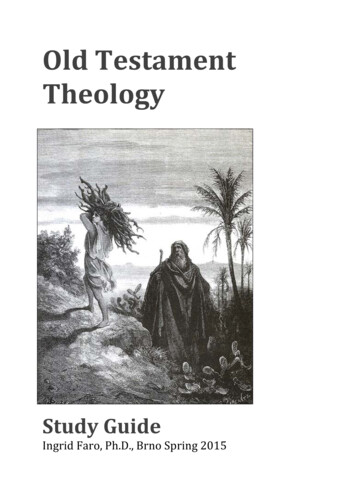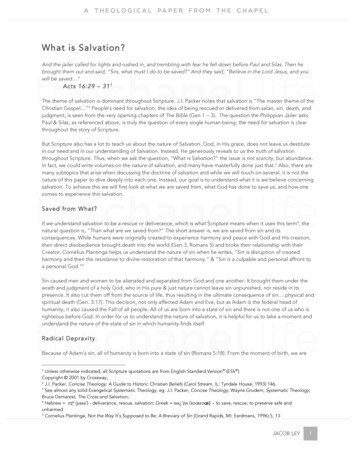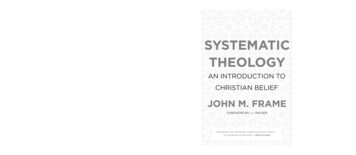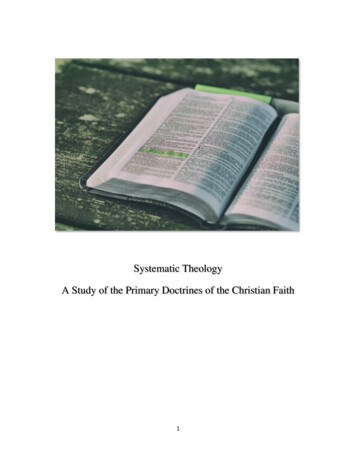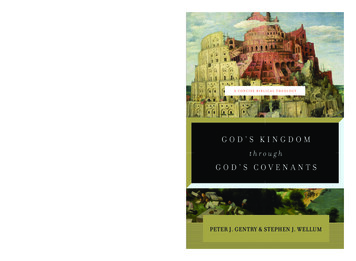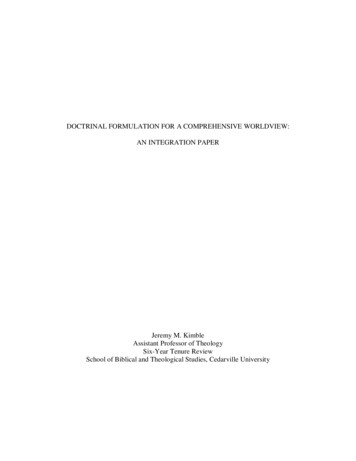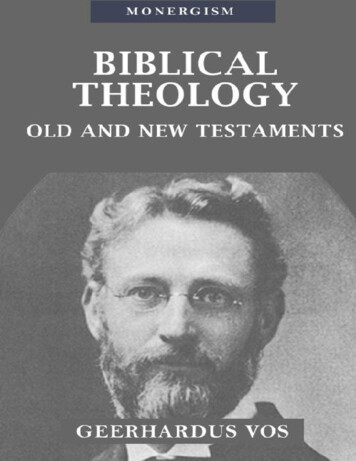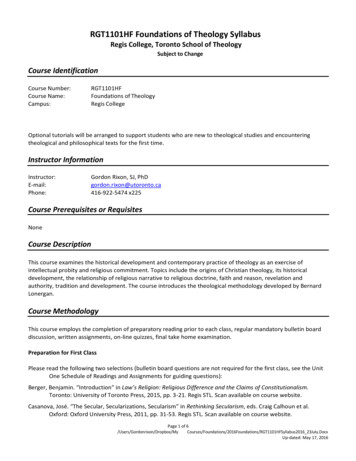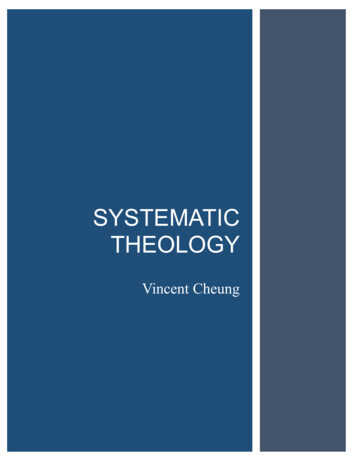
Transcription
SYSTEMATICTHEOLOGYVincent Cheung
To Denise,my wife, best friend, companion for life,fellow-servant to the Lord Jesus Christ,and partner in the publication of his gospel,to her, I dedicate all my writings,with great love and affection, forever.Copyright 2010 by Vincent Cheunghttp://www.vincentcheung.comPrevious editions published in 2001 and 2003.All rights reserved. No part of this publication may be reproduced, stored, or transmittedwithout the prior permission of the author or publisher.Unless otherwise indicated, Scripture quotations are taken from the HOLY BIBLE, NEWINTERNATIONAL VERSION. Copyright 1973, 1978, 1984 by International BibleSociety. Used by permission of Zondervan Publishing House. All rights reserved.2
CONTENTS1. THEOLOGY . 4THE NATURE OF THEOLOGY. 4THE POSSIBILITY OF THEOLOGY . 5THE NECESSITY OF THEOLOGY . 92. SCRIPTURE. 13THE NATURE OF SCRIPTURE . 13THE INSPIRATION OF SCRIPTURE . 16THE UNITY OF SCRIPTURE. 19THE INFALLIBILITY OF SCRIPTURE . 24THE AUTHORITY OF SCRIPTURE . 25THE NECESSITY OF SCRIPTURE . 26THE CLARITY OF SCRIPTURE . 27THE SUFFICIENCY OF SCRIPTURE . 293. GOD. 32THE EXISTENCE OF GOD . 32THE ATTRIBUTES OF GOD. 51THE WORKS OF GOD. 1024. MAN . 110THE CREATION OF MAN . 110THE NATURE OF MAN . 118THE FALL OF MAN . 1345. CHRIST . 140THE PERSON OF CHRIST . 140THE LIFE OF CHRIST . 144THE WORK OF CHRIST . 146THE SUPREMACY OF CHRIST . 1596. SALVATION . 165ELECTED . 165SUMMONED. 190REGENERATED . 191CONVERTED . 193JUSTIFIED. 198ADOPTED . 202SANCTIFIED. 204PRESERVED . 2063
1. THEOLOGYTheological reflection is the most important activity a person can perform. This statementmay astonish some readers, but an explanation of the theological enterprise will providejustification for the claim. We shall consider the nature, possibility, and necessity of thisfield of study.THE NATURE OF THEOLOGYThe word THEOLOGY refers to the study of God. When used in a broader sense, it caninclude all the other doctrines revealed in Scripture. God is the supreme being who hascreated and now controls all that exists, and theology seeks to understand and articulate ina systematic manner information revealed to us by him. Thus theology is concerned withultimate reality. Since it is the study of the ultimate, nothing is more important. Andbecause it is a study of the ultimate, it defines and governs every other area of thought andlife. Therefore, as long as God is the ultimate being or reality, theological reflection is theultimate human activity.This book is a presentation of several major biblical doctrines that come under the study ofsystematic theology. A doctrine consists of a set of ideas or propositions on a topic, so abiblical doctrine is the biblical teaching on a subject. Theology refers to the study of theBible or the systematic formulation of doctrines from the Bible. A biblical doctrine isalways binding, and a system of theology is authoritative to the extent that it reflects theteachings of the Bible.Many Christians think it is wrong to study theology for its own sake. An anti-intellectualspirit has so infiltrated the church that they refuse to believe that intellectual activitypossesses intrinsic value. But this implies that even knowing God must serve a greaterpurpose, probably a practical or ethical one. Although the knowledge of God ought to affectone's conduct, it is a mistake to think that the intellectual enterprise of theology serves apurpose that is greater than itself. Rather, since to study theology is to know God, and toknow God is the highest purpose of man, theology possesses the highest intrinsic value. AsJeremiah 9:23-24 says:This is what the LORD says: "Let not the wise man boast of hiswisdom or the strong man boast of his strength or the rich man boastof his riches, but let him who boasts boast about this: that heunderstands and knows me, that I am the LORD, who exerciseskindness, justice and righteousness on earth, for in these I delight,"declares the LORD.There is no higher purpose for which the knowledge of God intends to reach, and there isno higher purpose for man but to know God. Theological knowledge can produce moral4
virtues and other effects in a person's life, but we should not regard them as higher purposesthan the knowledge of God and his revelation.THE POSSIBILITY OF THEOLOGYPrior to the construction of a theological system, it is necessary to establish that theologicalknowledge is possible. "God is Spirit" (John 4:24) – he transcends the spatiotemporalexistence of man. Thus the question is whether man can know anything about God, or howman can know anything about him. The Bible's answer is that it is possible for man to haveknowledge about God because God has revealed himself to man.The Bible teaches that the universe displays God's glory. The magnitude and excellence ofthe things that God has created offer testimony to his power and wisdom:The heavens are declaring the glory of God, The vast expansedisplays his handiwork. Day after day they "pour forth speech";Night after night they display knowledge. They have no speech,there are no words; No sound is heard from them. Their "voice" goesout into all the earth, Their words to the ends of the world. (Psalm19:1-3)1However, man does not directly perceive this testimony, and he does not logically inferinformation about God from it. As Paul writes, "For since in the wisdom of God the worldthrough its wisdom did not know him, God was pleased through the foolishness of whatwas preached to save those who believe" (1 Corinthians 1:21). God has made a point ofpreventing non-Christians from knowing him through their own wisdom.Therefore, although the testimony of creation is strong and evident, man cannot gainknowledge about God by an observation of the world. This does not mean that some menhave no concept of God in their minds. In fact, the Bible teaches that every man knowsabout God, but this knowledge does not come from observation. Rather, Paul writes that ithas been "written" into the mind of man – it is an innate knowledge:Indeed, when Gentiles, who do not have the law, do by nature thingsrequired by the law, they are a law for themselves, even though theydo not have the law, since they show that the requirements of thelaw are written on their hearts, their consciences also bearingwitness, and their thoughts now accusing, now even defending them.(Romans 2:14-15)21Robert L. Reymond, A New Systematic Theology of the Christian Faith; Nashville, Tennessee: ThomasNelson, Inc.; p. 396. The NIV reads, "The heavens declare the glory of God; the skies proclaim the work ofhis hands. Day after day they pour forth speech; night after night they display knowledge. There is nospeech or language where their voice is not heard."2"So, when gentiles, not having the Law, still through their own innate sense behave as the Lawcommands, then, even though they have no Law, they are a law for themselves. They can demonstrate theeffect of the Law engraved on their hearts, to which their own conscience bears witness " (v. 14-15,NJB).5
Theologians call the testimony of creation and the innate knowledge in the mind of manGod's GENERAL REVELATION.3 Although all men know about God in this manner, it doesnot mean that all men consciously acknowledge him. In fact, since all men are sinful, theyrefuse to acknowledge this God that they know, but attempt to suppress the truth:The wrath of God is being revealed from heaven against all thegodlessness and wickedness of men who suppress the truth by theirwickedness, since what may be known about God is plain to them,because God has made it plain to them. For since the creation of theworld God's invisible qualities – his eternal power and divine nature– have been clearly seen, being understood from what has beenmade, so that men are without excuse. For although they knew God,they neither glorified him as God nor gave thanks to him, but theirthinking became futile and their foolish hearts were darkened.(Romans 1:18-21)4Nevertheless, this knowledge is indestructible and undeniable, so that it surfaces indistorted forms in non-Christian religions, philosophies, and ethical principles.Thus God has revealed his existence, attributes, and some of his moral demands to everyperson by including this information in the human mind. This knowledge is innate and isnot derived by reasoning from sensation. Man does not infer from what he observes innature that there must be a God; rather, he knows the God of the Bible before he has anyaccess to empirical data. Interaction with creation, including the act of observation,stimulates the mind of man to recall this innate knowledge, which has been suppressed bysin.Every person has an innate knowledge of God, and everywhere he looks nature remindshim of it. His every thought and every experience testifies to God's existence and attributes;the evidence is inescapable. Therefore, those who deny the existence of God aresuppressing the truth because of their wickedness and rebellion. Although they claim to bewise, they have become fools (Romans 1:22). God's general revelation of his existence andattributes through his creation – the innate knowledge in man and the characteristics of theuniverse – renders without excuse those who deny that he is and what he is, and so theyare rightly condemned.Although every person has an innate knowledge of the existence and attributes of God, andthe universe serves as a constant reminder, general revelation excludes much information3This is also called natural revelation – God's disclosure of himself through nature, or God's mark in hiscreation. A system of theology allegedly derived from general or natural revelation is called naturaltheology. To express biblical teaching in theological terms, we would say that there is a general or naturalrevelation (Psalm 19:1-3), but it is impossible to derive a natural theology on the basis of this revelation (1Corinthians 1:21).4" ever since the creation of the world, the invisible existence of God and his everlasting power havebeen clearly seen by the mind's understanding of created things. And so these people have no excuse " (v.20, NJB).6
about God and his creation, and in particular it does not contain information necessary forsalvation – it does not contain the gospel. Thus God has revealed what he has decided toteach us by verbal revelation, that is, the Scripture. In other words, he talks to us and tellsus what he wants us to know: "The secret things belong to the LORD our God, but thethings revealed belong to us and to our children forever, that we may follow all the wordsof this law" (Deuteronomy 29:29). Theology is possible because God has revealed himselfto us through the words of the Bible.This is his SPECIAL REVELATION. It contains rich and precise information about God andthe things that he has decided we should learn. It is from the Bible that we obtain knowledgethat is necessary for salvation. It is from the Bible that we come to know the message aboutJesus Christ, that we need to be saved from sin and hell, and how we can be saved throughhim:But as for you, continue in what you have learned and have becomeconvinced of, because you know those from whom you learned it,and how from infancy you have known the holy Scriptures, whichare able to make you wise for salvation through faith in Christ Jesus.(2 Timothy 3:14-15)It is possible for man to know God through his revelation because God has made man inhis own image, so that there is a point of contact between the two despite the transcendenceof God. Animals and inanimate objects cannot know God the way man can even if they arepresented with his verbal revelation, since they cannot receive and understand it.God has chosen to reveal information to us through the Bible – in words rather than inimages or experiences, to tell instead of to show. His revelation to us is rational andintellectual in nature, and not mystical or empirical. Verbal communication is superiorbecause it can be precise, accurate, and extensive. Since the Bible assumes this form ofcommunication, a worthy theological system must be derived from biblical propositions,and not from a non-verbal basis such as religious feelings and experiences, or irrationalconstructions such as scientific theories.5Every system of thought begins with a first principle, and on this basis derives the rest byinductive or deductive reasoning, or a combination of the two. Induction is a formal fallacy,since due to the form or structure of the reasoning process, the conclusion is never alogically necessary result of the premises. The fallacy occurs when one reasons fromparticulars to universals. Now, reasoning on the basis of empirical data requires induction,since sensations are particulars, and every worldview must contain universal concepts andpropositions, such as man, car, red, size, and so on. Therefore, induction and empiricismare irrational, and a system that places any dependence on either must inevitably collapseinto skepticism. Skepticism is the position that knowledge is impossible, but it is selfcontradictory, since it maintains that we can know that we cannot know.5Science is irrational because it commits the fallacies of empiricism, induction, and affirming theconsequent (experimentation).7
Deduction is the only valid form of reasoning. It proceeds from premises to conclusions bylogical necessity. However, since deductive reasoning never produces information that isnot already implicit in the premises, the first principle of a deductive system must containall the information for the rest of the system. This means that a first principle that is toonarrow will fail to provide a sufficient number of propositions to produce a comprehensiveand coherent worldview, or a system of thought that is able to answer all necessaryquestions. Thus knowledge is impossible on the basis of induction, empiricism, or anyinadequate first principle.Even if a first principle appears to be sufficiently broad and contains enough informationto construct a worldview, there must be justification for it, or some reason for affirming itover another. The justification for a first principle cannot come from a higher authority ora prior premise, for then it would not be the first principle. A lower authority or premisewithin the system cannot justify the first principle, since it is on this very first principle thatthis lower authority or premise depends. Therefore, a first principle of a system of thoughtmust be self-authenticating – it must stand on its own authority.The Bible is the ultimate authority of the Christian system; therefore, our first principle,our starting point, or the foundation of our thinking, is the Bible itself. This may beexpressed by any proposition that represents all the contents of the Bible, such as "TheBible is truth" or "The Bible is the word of God."Although empirical, inductive, and scientific arguments have been formulated in supportof biblical revelation, and although they seem to be forceful given empirical assumptions,so that no empirically inclined non-Christian can refute them, the Christian must regardthese arguments as unreliable because – as I have extensively argued elsewhere – allempirical, inductive, and scientific methods are irrational and prevent the discovery oftruth.6 Moreover, if we were to depend on empirical arguments and procedures to justifythe Bible, the empirical assumptions would then stand as judge over the very word of God,so that Scripture would no longer be the ultimate authority in our system. As Hebrews 6:13says, "When God made his promise to Abraham, since there was no one greater for him toswear by, he swore by himself." Since God possesses ultimate authority, there is no higherauthority by which one may pronounce the Bible as infallible and inerrant.That said, not every system that claims divine authority has within its first principle thecontent to justify itself. A sacred text might contradict itself and self-destructs. Anothermight admit dependence on the Christian Bible, but the Bible condemns all other allegedrevelations. In any case, if the Bible is true, and it claims exclusivity, then all other systemsof thought must be false. Therefore, if one affirms a non-Christian worldview – anyworldview other than strict biblical Christianity – he must at the same time reject the Bible.This generates a clash between the two worldviews. When this happens, the Christian canbe confident that his system of thought is impervious to the attacks from others, but thebiblical system itself provides the content for both defense and offense. The Christian candestroy the non-Christian's worldview by questioning the first principles and the subsidiary6See Vincent Cheung, Ultimate Questions, Presuppositional Confrontations, and Captive to Reason.8
propositions of the system. Does the first principle of the system contradict itself? Does itfail to satisfy its own requirements?7 Does the system crumble because it assumes thereliability of sensation, induction, and the scientific method? Does its subsidiarypropositions contradict one another? Does it borrow Christian premises not deducible fromits own first principle? Does the system provide coherent answers to the ultimate and thenecessary questions, such as those concerning epistemology, metaphysics, and ethics?8The first principle, the starting point, or the foundation of the Christian system is the Bible.From this first principle, the theologian constructs a comprehensive system of thought. Tothe extent that his reasoning is correct, every part of the system is deduced by logicalnecessity from the infallible first principle, and is thus equally infallible. And since theBible is the verbal revelation of God, who demands our worship and commands ourconscience, a system of theology validly deduced from revelation is authoritative andbinding. Therefore, to the extent that this book is accurate in presenting what Scriptureteaches, it represents what Christians have pledged to believe and what all men ought tobelieve, because it represents universal and objective truths that God has revealed.THE NECESSITY OF THEOLOGYTheology is necessary for all of thought and life. Since God is the beginning, the ultimate,and the omnipotent creator, he has the authority to address all aspects of our lives, and hehas the power to enforce his commands and his wishes. Therefore, when he speaks, wemust listen, believe, and submit. Christian theology systematizes his verbal revelation, andit is authoritative to the extent that it reflects the teachings of the Bible. The necessity oftheology is a question of the necessity of communication from God. Since this is God'suniverse, divine revelation is the infallible and binding source of information andinterpretation regarding all of thought and life. Since God has spoken, and since it isnecessary to hear him, to believe him, to obey him, and to declare him, theology isnecessary.Theology is central to all of thought and life because it deals with the verbal revelation thatcomes from the supreme being – the essential reality that gives existence and meaning toeverything. To illustrate, ignorance of musical theories has no direct relevance to one'sability to do algebra or to reason about moral issues. A lack of athletic abilities is unlikelyto hinder a person's performance in the kitchen. But ignorance of divine revelation affectsall of thought and life, from one's view toward history and philosophy, to one'sinterpretation of music and literature, to one's understanding of mathematics and physics.Since this is God's universe, only his interpretation about anything is correct, and he hasrevealed his thoughts in the words of the Bible. It follows that an ignorance of theologymeans that a person's interpretation of every subject will lack the defining factor that putsit into the proper perspective. When it comes to ethics, for example, it is impossible toderive or establish any universal moral principle without an appeal to God. Even the very7For example, a principle stating that every assertion must be empirically verified cannot itself beempirically verified. The principle self-destructs.8For instructions on biblical philosophy and apologetics, see Vincent Cheung, Ultimate Questions,Presuppositional Confrontations, Apologetics in Conversation, and Captive to Reason.9
ideas of right and wrong remain undefined without his verbal revelation – he must definethese concepts for us, and only his definitions are authoritative, relevant, and binding onall people. And since the Bible is the only objective and public divine revelation, the onlyway to appeal to God's authority – the only way to construct a public theology, philosophy,or apologetic – is by an appeal to the Bible.There is intrinsic value in knowledge about God. Whereas every other kind of knowledgeis a means to an end, knowledge about God is a worthy end in itself – we do not know Godin order to know or to do something more important. Since theology is the study of God,or the systematization and articulation of knowledge about God, in terms of its value, it isself-justified. Of course, the knowledge of God is the foundation for a right knowledge ofall other things, and it is the foundation for right purpose, right action, and so on. But itsvalue does not depend on the effect that it has on these other things. It is important and itsstudy is justified just because of what it is. To say that theology is not an end in itself carriesthe blasphemous implication that God is not the ultimate. And since God has revealedhimself through the Scripture, to know the Scripture is to know him, and this means tostudy theology.Many Christians have succumbed to the anti-intellectual spirit of the world, and as a resultthey make a sharp distinction between knowing God and knowing about God. If to "knowabout" God represents the study of theology, then to them a person may know much aboutGod but not know God, or he may know God but not know much about God. A person'stheological knowledge is disproportionate to how well he knows God, and some peopleseem to think that the more one knows about God, the less one knows God. That is,knowing about God is not only distinguished from knowing God, but in some cases, andcertainly when it is very emphasized, knowing about God may even hinder a person fromknowing God.This is anti-intellectualism. Another name for it is insanity. Yet, in various forms, it isrampant among those who call themselves Christians, and even those who claim to opposeanti-intellectualism are often infected by this way of thinking. The assumption that poisonstheology is that piety is at least somewhat, if not entirely, non-intellectual and non-rational.This assumption is unbiblical, arbitrary, false, and very dangerous.If it is possible to know God without knowing very much about him, then what does itmean to know God? If knowing God means to have some kind of fellowship with him (1John 1:3), then it entails at least recognition – one must know that he is, what he is, andhow to fellowship with him. A person who fellowships with God must know that there isa God, that God is a Trinity – Father, Son, and Holy Spirit – and not Allah, or Buddha, hisneighbor's cat, or the tree in his backyard. He must know the conditions under which hemust relate to this God, and he must know the means and methods that make this fellowshipwith the Deity possible. All of this entails knowing things – many, many things – aboutGod. Fellowship also involves communication, which requires the exchange of thoughts,and this again entails knowledge about many, many things, and about many words andideas. One cannot communicate with another without exchanging information in the form10
of propositions, or in a manner in which the information conveyed is reducible topropositions.How does a person know God, if not through knowing about him? Some people mightanswer that we know God through religious experience. But religious experience is definedand interpreted by theology, or knowledge about God. What is a religious experience? Howdoes a person know he has received one? What does a particular feeling, sensation, or evenapparition or encounter mean? Is the experience from God or Satan? The Bible warns thatthe devil can appear as an angel of light. Answers to these questions can only come bystudying God's verbal revelation. And even if it is possible to know God through religiousexperience, what one gains is still knowledge about God, or intellectual informationreducible to propositions.A person may claim to know God through prayer and worship. But what does this mean?Is this just another way of asserting that we know God by religious experience? Do wesense something or undergo a process that permits us to know him better? But again, whatis this "better," if it is not a fuller knowledge about God? If knowing about God andknowing God can be sharply distinguished, then one must define knowing God in a waythat avoids any overlap with knowing about God. We already know what knowing aboutGod means. If knowing God remains undefined, then it might be only a pious-soundingway to say the same thing as knowing about God, and the distinction adds nothing to ourfaith except confusion and false spirituality.In any case, the object and practice of prayer and worship remain undefined until atheological formulation about them is established. Before a person can properly pray andworship, he must first determine to whom he offers prayer and worship. Afterward he mustdetermine the way in which he must offer prayer and worship. All this means that asystematic study of Scripture is nec
THE NATURE OF THEOLOGY The word THEOLOGY refers to the study of God. When used in a broader sense, it can include all the other doctrines revealed in Scripture. God is the supreme being who has created and now controls all that exists, and theology seeks to understand and articulate
